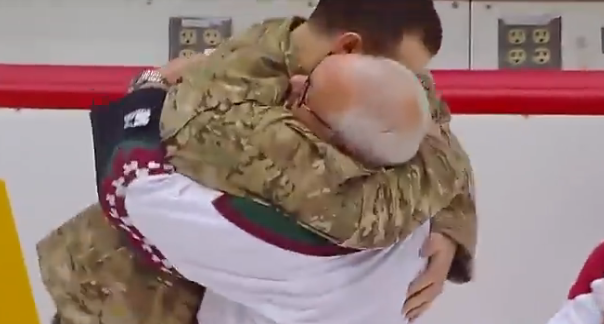

At a recent speaking engagement, during which I shared how, despite my achievements and success, I found myself in a very dark place a few years ago, someone asked me:
"What helped you commit to finding a different path when you felt so hopeless?"
It was my daughter, Mia.
I wanted to be there for her, not just as a great mom, but also as a great role model. I wanted her to learn to live from love rather than fear, to learn how to get through the rough parts of life with self-compassion, to have the tools to ride out life's storms and to be able to truly swim in joy during the good parts.
The only way could teach her how to do all this was to learn to do it myself.
I end all my talks and Happier @ Work workshops with this phrase:
You can't give what you don't have.
The best way to help people we love live with joy, self-compassion, a sense of meaning, and acceptance is to practice these skills ourselves.
I'm still on the journey and practicing daily, but I did learn the skills of self-compassion and acceptance -- of life, of situations, of not being able to always control everything (OMG this was a hard one!), and of myself.
I could tell that my daughter was picking some things up from me along the way -- I tried to openly share what I was learning as well as what I struggled with. But this week she gave me one of my most cherished gifts.
She read me her 8th grade graduation speech.
As she read it to me for the first time, my heart burst wide open with so much love and pride... and gratitude for taking this difficult but amazing journey myself so that I could share the lessons I've learned with her.
With her permission, I'm sharing it with you. If you have a teenager in your life, I hope you will share it with them.
How Acceptance Helped Me Survive Middle School
By Mia Kogan-Spivack
Today I’m going to talk about something incredibly important that helped me survive my last two years of middle school: acceptance. More specifically, acceptance as the ability to recognize the reality of a situation or a person without trying to change them. Accepting grades you get without trying to change the past, accepting that some people will come in and out of your life, and accepting that not everyone is going act the way you wish they would. Instead of trying to change the past, live in the present and the future.
I can’t even begin to list the countless tests and projects I got back with a lower than expected grade at the top, and the number of times I handed in a test assuming I’d aced it only to receive the packet back with a “75” written at the top. When I was in fifth, sixth, even the beginning of seventh grade, I would go home and keep it from my parents.
But more than just hiding it from them, I would sulk. I would beat myself up about it and wonder what I could’ve done to make it better. Until my mom discovered something and decided to share it with me: wondering what wasn’t right in the past does nothing. In fact, it has a negative effect. She taught me that I needed to accept the grade I got, because there was nothing I could do about it once it happened. But I could do something about the future, and the next test; I could work and study harder to get the grade I wanted and the grade I felt I deserved.
Acceptance wasn’t just about academics; I had to practice it with social issues, too.
Throughout seventh and the beginning of eighth grade, I had a group of friends that I thought would last forever. Realistically, of course, it didn’t. They cut me off and pushed me out of the group later in eighth grade, and I started to wonder what I had done in the past that caused them to force me out. But the more I thought about it, the more I realized two things.
First, that I hadn’t done anything wrong and needed to stop worrying about why I had been cut off. But the second and more important idea was that I couldn’t change the past or change the way others acted. I could only change and work on myself. I realized through the power of acceptance that it was necessary for me to accept the fact that I was no longer friends with these people, and rather than constantly wonder what had gone wrong, I should move forward. I couldn’t do anything about what had happened, but I could do something about my future. Instead of sitting around and wishing they hadn’t let me go, I could take this opportunity to find new friends.
I think that acceptance was one of the core life skills that helped me during my rough times throughout middle school.
Because it applies to almost everything, both in life and in school: social issues, bad grades, and tough classes. You need to be able to accept what happens and learn from life, but that also doesn’t mean you don’t care. Accepting a bad grade without tearing yourself down doesn’t mean you stop trying to do better. I learned that I should always strive to do my best work, but didn’t need to criticize myself when things didn’t go the way I’d expected or wanted them to.
Acknowledging a certain situation without trying to fix it when it’s impossible to do so is a core part of life. Stop thinking about what you could’ve done in the past, because you can’t go back in time. Instead, accept your life and learn from it.
Don't miss your happier boost!
Subscribe to our weekly email to get practical tips and inspiration to help you feel more joyful and resilient.


